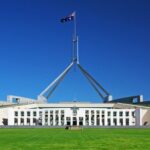Overhaul of Stacked AAT Slated, in Attempt to End Canberra Cronyism

The Grattan Institute released a report on Sunday, outlining that cronyism, or appointing mates to favoured positions, is alive and well in Canberra, with 21 percent of “well-paid, powerful and/or prestigious” federal government board positions currently being occupied by political appointees.
Of particular note are the 320 members of the Administrative Appeals Tribunal, of which 70, or 22 percent, have a direct political affiliation.
Incoming Labor attorney general Mark Dreyfus indicated early on in his appointment, that he’s currently carrying out a review of the independent expert body, with one possibility being that it be scrapped and replaced.
In its inquiry into the AAT, the Senate Committee on Legal and Constitutional Affairs recommended abolishing the tribunal last March, suggesting that the attorney general dismantle it and re-establish a new one by 1 July next year.
“There were repeated claims that the selection of members – particularly in recent years – has been inappropriately influenced by personal connections and political affiliations,” reads the interim committee report, which was headed by now former Labor Senator Kim Carr.
A spectator sport
AAT appointments are made by the attorney general, without the need of any submitted reasons. The Grattan Institute suggests that “this provides the opportunity for ministers to nominate political friends and colleagues, without them going through a merit selection process”.
The Commonwealth tribunal plays a key role in reviewing federal government decisions relating to migration, asylum seekers, industrial law, social security and the NDIS. The body, whose independence is increasingly under scrutiny, was established in mid-1976.
In its Cronyism in Appointments to the AAT report released in March, The Australia Institute outlines that during the Abbott/Turnbull/Morrison administration, the number of political appointees to the AAT rose sharply.
According to the independent think tank, of the tribunal appointments made by the Howard and Rudd/Gillard/Rudd governments, only 6 percent and 5 percent respectively could be classed as being politically motivated decisions.
But over the last 9 years of Coalition rule, this leapt to 32 percent of all positions filled, while it was during PM Scott Morrison’s elected term that preferential appointments escalated to the point where 40 percent of all vacant AAT seats were filled by Liberal National political associates.
Indeed, the report underscores that beyond this blatant nepotism, there has been an erosion of “good governance” as a growing number of people appointed to the position of senior member have no legal qualifications, with over a quarter of political appointees holding no such credentials.
In opposition, Dreyfus blasted former attorney general Christian Porter in February 2019 for having appointed 6 former MPs and 8 ex-Coalition staffers to AAT positions, out of a total of 34 seats filled at the time.
While a week before the last election was announced, then attorney general Michaelia Cash choose three former Liberal state MPs and three Coalition advisers amongst 19 new members being appointed.
Securing future outcomes
Civil Liberties Australia (CLA) CEO Bill Rowlings told Sydney Criminal Lawyers in late 2020 that Porter had stacked the AAT with members connected to the Liberals in the lead up to the 2019 election, as the minister had “thought the Coalition was going to lose”.
The issue with stacking bodies like the AAT with political players is currently being played out globally, as the US Supreme Court, which Trump ensured is top heavy with Republicans, is currently making decision after decision in favour of ultraconservatives, including revoking abortion rights.
So, if a political party, like the Liberals, has placed enough of its affiliates in key positions at the appeals tribunal, it can then be assured that decisions will be made favourably in terms of its agenda, regardless of whether it’s actually holding office.
Dreyfus told Radio National on 28 June that the Albanese government will be restoring a “transparent and merits-based system” for appointments to the AAT, with panels being established to conduct interviews in regard to member vacancies.
On being questioned whether he might reverse past AAT appointments, the nation’s chief lawmaker said, “I am going to be fully reviewing the operations of the Administrative Appeals Tribunal to make sure that it is fit for purpose, to make sure that it is working at the optimum level.”
“I’m engaged, right now, in a very serious review of the way in which the Administrative Appeals Tribunal is serving Australians, whether or not there are sufficient members… the reasons why there are such big backlogs in particular areas,” he added. “Part of that will be whether it’s got sufficient resources.”







